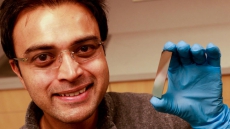A team of biomedical engineers has developed the world's fastest camera, a device that can capture events up to 100 billion frames per second.
The current ultrafast imaging techniques are limited by on-chip storage and electronic readout speed to operations of about 10 million frames per second.
"For the first time, humans can see light pulses on the fly," said Lihong Wang, professor of Biomedical Engineering at Washington University in St. Louis.
"Because this technique advances the imaging frame rate by orders of magnitude, we now enter a new regime to open up new visions,” said Wang.
The team used a technique called compressed ultrafast photography (CUP) to make movies of the images they took with single laser shots.
This is a series of devices customised to work with high-powered microscopes and telescopes to capture dynamic natural and physical phenomena.
Once the raw data are acquired, the actual images are formed on a personal computer.
"These ultrafast cameras have the potential to greatly enhance our understanding of very fast biological interactions and chemical processes and allow us to build better models of complex, dynamical systems," said Richard Conroy from National Institute of Biomedical Imaging and Bioengineering, US.
The camera may have wider application in areas like biomedicine, astronomy and forensics.
"Combine CUP imaging with the Hubble Telescope, and we will have both the sharpest spatial resolution of the Hubble and the highest temporal solution with CUP," said Wang.
“Each new technique, especially one of a quantum leap forward, is always followed a number of new discoveries. It's our hope that CUP will enable new discoveries in science -- ones that we can't even anticipate yet," said Wang.
The research appeared in the journal Nature.





